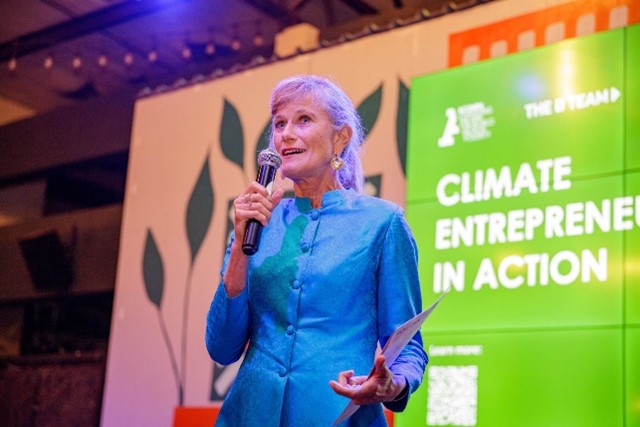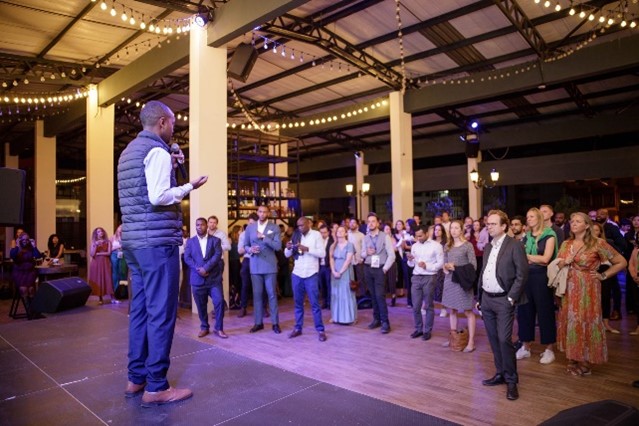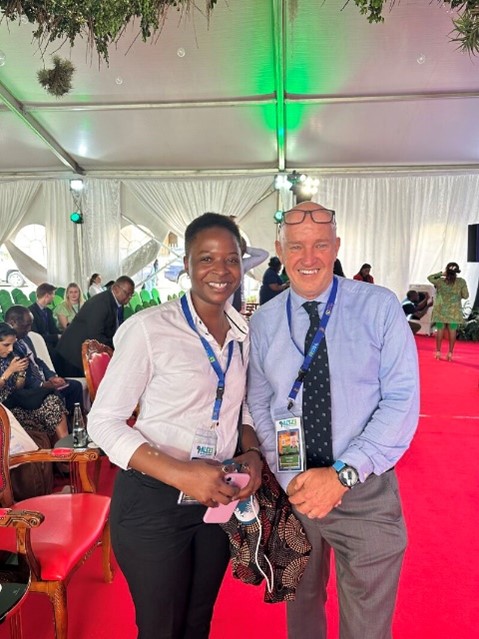‘Driving green growth and climate finance solutions for Africa and the world’ – the slogan that graced the promotional efforts of the very first Africa Climate Summit (ACS), organised in parallel with Africa Climate Week. The three-day event took place last month in Nairobi, Kenya, the African continent’s epicentre of innovation and home to some of Africa’s leading start-ups attracting substantial investment over the past five years.
The location lent itself to a host of climate-first investors, innovators, and clean energy enthusiasts convening amongst senior government officials from not only Kenya but all corners of the continent. Amongst the pledges and declarations was the noteworthy arrival of Kenyan President Willam Ruto driving an electric vehicle from the State House to the convention centre hosting the summit, with an entourage of e-motorcycles from by PREO-funded enterprise Ecobodda.
The summit was also the backdrop for the establishment of the Nairobi Declaration which 20 African governments have adopted. The Declaration is centred around establishing new financing infrastructures to respond to Africa’s needs, including debt restructuring and debt relief to leapfrog traditional development pathways and enable green growth.
Now that the dust has settled, TEA partners participating in the summit have shared their reflections on whether it delivered on its ambitions.
Acumen amongst other key sector players brought together visionary leaders and entrepreneurs dedicated to accelerating progress. On the first day, Acumen kicked off discussions around innovative energy solutions that can bring positive change to the last mile. Acumen’s CEO, Jacqueline Novogratz participated in a panel discussion with experts from d.light, USAID, Shinhan Bank, and the Green Climate Fund. The panel ‘Hardest-to-reach: Social entrepreneurs powering Africa’s last mile’ was hosted as part of the broader Africa Climate Weeks’, Green Climate Fund Private Investment for Climate Conference (GPIC).
Maintaining the focus on the pivotal role of social entrepreneurs in addressing climate change in Africa, Acumen along with The B Team hosted an evening reception showcasing climate entrepreneurs leading the way for the most vulnerable communities. Contributing to this was Denis Karema, CEO of valued TEA-supported enterprise SokoFresh. The Kenya-based, cooling-as-a-service social enterprise has seen rapid success winning last year’s prestigious Ashden Award for Energising Agriculture. During the session, emphasis on the need for flexible capital, partnerships, and urgent collaboration to create a sustainable and equitable future were the main topics of discussion. It was also stated that Africa’s minimal contribution to global emissions remains a stark contrast to the continent’s outsised vulnerability to climate shocks.


Climate vulnerability remained a hot topic and Africa Climate Summit was a prime opportunity for GOGLA to launch its Powering Adaptation and Climate Justice paper supported by the IKEA Foundation, in partnership with Acumen, Efficiency for Access, Ashden and WWF. The paper homes in on the climate impact potential of 5 off-grid solar technologies and their transformative potential to support climate adaptation, powering green growth and helping to combat the impacts of droughts, floods, and storms Millions of the most climate-vulnerable communities across the world, often the smallest contributors to climate change could benefit from these technologies. . The timely paper further delves into the.
Beyond off-grid solar solutions, CLASP has been working to identify critical appliance access gaps in cooling, communication, and commercial appliances. ACS made for a useful platform to highlight the need to seize the opportunity to address these gaps during CLASP’s side event ‘The Opportunity of Appliance Access for a Climate-Resilient Africa’ with valuable contributions from Efficiency for Access (LEIA). The session explored the barriers governments face due to a lack of technical information on appliances, highlighting CLASP’s efforts in analysing Minimum Energy Performance Standards (MEPS) for six key appliances across ten major economies. This insight has been crucial in debunking the misconception that high quality always equates to high cost as energy-efficient standards and labelling can actually lower initial purchase costs. CLASP was also a key contributor to Kenya’s recently launched National Cooling Action Plan (NCAP) in which contributions on improving agricultural cold chains were implemented.
The need to harness the full potential of innovative solutions while building local capacity has received further backing with the launch of The African School of Regulation (ASR). The centre of excellence officially launched during Africa Climate Summit is being co-hosted by the Republic of Kenya and the African Union and will be incubated by the African Capacity Building Foundation (ACBF) with headquarters in Accra, Ghana. Expected to become a hub of excellence for knowledge exchange and training that helps scale investment and development of more affordable, reliable and sustainable energy systems will convene partners to build on existing knowledge of local needs.
Among the exciting larger declarations at both country and regional levels, the Enabling African Cities for Transformative Energy Access (ENACT) project co-hosted two high-level tracks over the course of the three-day summit. ICLEI participated in a side session exploring public-private collaboration in scaling up mini-grid development for clean energy access as part of the track on energy systems and industry. The second track more focused on local governments and implemented by ICLEI Africa, saw ENACT launch a clean cooking explainer video to help attendees visualise the impact of clean cooking in urban informal settlements in Kampala and Freetown.
Video – Clean cooking in Sub-Saharan Africa explainer
In Kenya, while 9.2 million consumers are connected to electricity, only 3% have cooking appliances and only 1% cook with electricity as a primary method. With that in mind, clean cooking remained steadfast on the agenda as the Global Electric Cooking Coalition (GeCCo) was launched as part of a joint initiative of the Global Energy Alliance for People and Planet (GEAPP), Ayrton Fund supported, Modern Energy Cooking Services (MECs), Sustainable Energy for All (SEforALL) and Energising Development (EnDev). GeCCo is a significant milestone in global efforts to achieve universal access to clean cooking by 2030.
Africa Climate Summit also proved to be highly valuable for TEA partners wanting to engage with the sector. Global Platform for Action’s (GPA), Joelle Hangi used the summit to advocate for facilitating energy access in humanitarian displacement settings and raise the profile of the Leave No One Behind (LNOB) Transforming Humanitarian Energy Access (THEA) initiative.

Overall, the first ACS proved to be a valuable event for TEA partners and the large delegation of attendees who convened in Nairobi. The location and attendance from governments across the continent and the establishment of the Nairobi Declaration mark a clear indication of the urgent need to work together to combat and mitigate the impacts of climate change on vulnerable communities. As the road to COP28 continues we stand firm in our commitment as a platform to accelerate progress toward clean, accessible, affordable energy for all.